Integrative Health gives quality of life to patients with chronic diseases
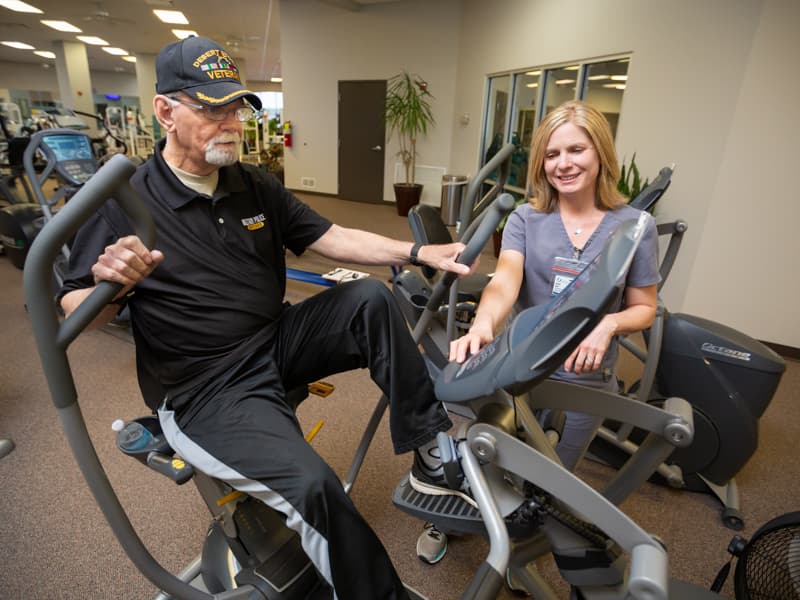
After his liver transplant in December 2018 at the University of Mississippi Medical Center, Richard Norton needed help getting back his strength and getting rid of post-surgery headaches.
The Florence resident’s caregivers in University Transplant referred him to UMMC’s Center for Integrative Health, which offers physical therapy, mental health counseling and extended, targeted medical follow-up for patients with chronic conditions.
“When she gets through with me after an hour, I feel so much better,” Norton said of physical therapist Rachel Dear, who leads him through exercises that include time on a seated elliptical, climbing stairs and coordination drills. Dear also gives him deep muscle therapy via myofascial release, gentle sustained pressure to the back of the neck and head to relax contracted muscles and alleviate pain.
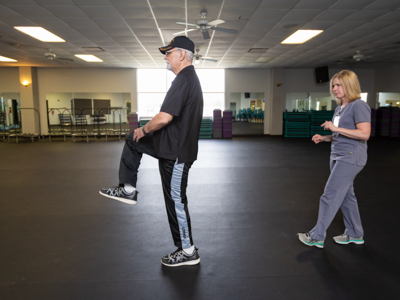
“She makes me try to touch the back of my shoes,” said Norton, a U.S Army Desert Storm veteran who was diagnosed with non-alcoholic cirrhosis of the liver in 2013. “My goal is to hang out with my grandchildren, and I’m getting there.”
The Center for Integrative Health, a part of the UMMC Department of Psychiatry and Human Behavior, opened recently inside Holmes Community College’s Wellness and Fitness Center, 331 Sunnybrook Road in Ridgeland. A typical center patient has a chronic condition – for example, diabetes, hypertension, depression or an organ transplant -- that’s managed by a primary caregiver or specialist.
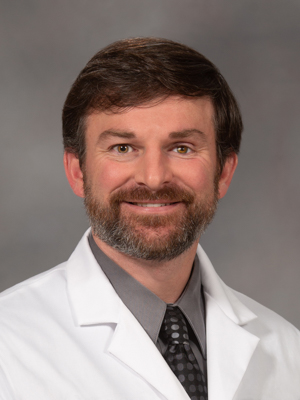
“What sets us apart is that we’re not looking to take over the patient’s primary care. We want to work with that team and with the patient to help them manage and cope with their chronic medical condition through lifestyle changes,” said Dr. Danny Burgess, associate professor of psychiatry and the center’s director.
Joining him on staff are Stacey Kitchens, a family psychiatric mental health nurse practitioner; and Dear, whose therapy targets a variety of methods to better equip patients with chronic illness to embrace exercise as an effective tool for managing their symptoms.
The center is unique in that it offers patients three sources of care that complement traditional medical care, with the goal of treating the whole person in mind, body and spirit. Every Wednesday, the three gather to talk as a team about each patient to achieve a holistic approach to their care.
“We can interact about how to best treat each patient, because we are all seeing the same patients,” Burgess said. “It’s a true integrative approach.
“We have a nurse practitioner who can do medication management if needed. We have a physical therapist who can work with individuals on a fitness program and help them to set goals,” Burgess said. “But, if Rachel notices they are experiencing stress, she can walk the patient over to me in the moment. That’s a setup that most clinics don’t have.”
The center takes referrals from both UMMC and non-UMMC providers, and patients also can refer themselves. To refer a patient or schedule an appointment, call 601-984-6925.
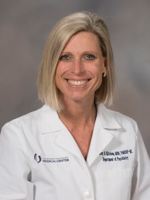
Kitchens, the center’s associate director, does a complete assessment on each patient that includes a look at care they’re already getting from other providers.
“A lot of my screenings are for mental health, but we also assess exercise and health behaviors. How much are they exercising? How familiar are they with the concepts of prayer, meditation or acupuncture, and have they tried them?’
Patients will be able to see “that getting well is about more than taking a pill that makes everything miraculously go away,” said Dr. Zeb Henson, associate professor of medicine, who plans to refer hypertension patients to the center.
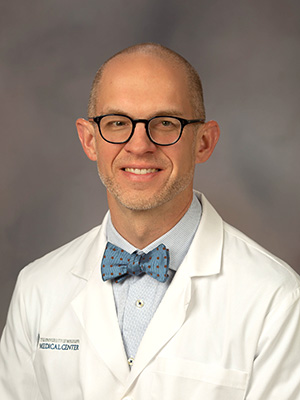
“The clinic will offer us a great opportunity to provide services that we don’t necessarily have time to provide in a routine primary care or hypertension clinic,” Henson said. “They’ll have good follow-up so that there can be accountability.”
The center is a valuable resource for bariatric surgery patients, said Adam Dungey, administrator for weight management services. “Many of us, whether we are a bariatric patient or not, use food as a coping mechanism,” Dungey said. “We’ve taken that away with bariatric surgery. Some patients say they feel like they’ve lost their best friend.
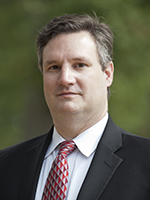
“We want them to have that mental and emotional support, and to find new coping mechanisms and outlets for their emotional issues,” he said.
“Exercise is very specific to a patient’s diagnosis,” Dear said. One example: A young adult loses a leg because of complications from diabetes, but needs lifestyle changes to put the brakes on their disease and increase physical mobility and endurance so that they can better interact with their family.
“We would help the patient incorporate prescribed exercises based on their real life, including their home, work and relationships,” Dear said. Patients also can receive assistance to allow them to perform those exercises at home or in a community fitness setting.
Kitchens said she “definitely wants to treat for depression and anxiety, but we also want to make sure we’re looking at their diet, exercise and how they do life first.” That can include what their normal day looks like, their quality of sleep, their appetite and behaviors they’d like to change.
“We’re not trying to give them a pill to fix it. We’re trying to create a relationship,” she said. “If they need medications, then we can talk about that.”
The center’s location was chosen with accessibility in mind, Burgess said. “It’s a stressor for a lot of patients to navigate the UMMC campus,” he said. “I can’t think of anything better than to treat someone, whether it’s an emotional or physical issue, in a wellness facility.”
“The simplicity of what we are doing is the most important,” Kitchens said. “Sometimes in health care, we jump 10 steps above that. We need to ask things like if you’re drinking enough water, or if you sleep enough.
“The simple approach has been more transformational for our patients.”
The public is invited to the center’s grand opening May 2 from 4-6 p.m. A brief ceremony and ribbon cutting begins at 4:15 p.m., followed by refreshments, a tour and health and fitness demonstrations.


